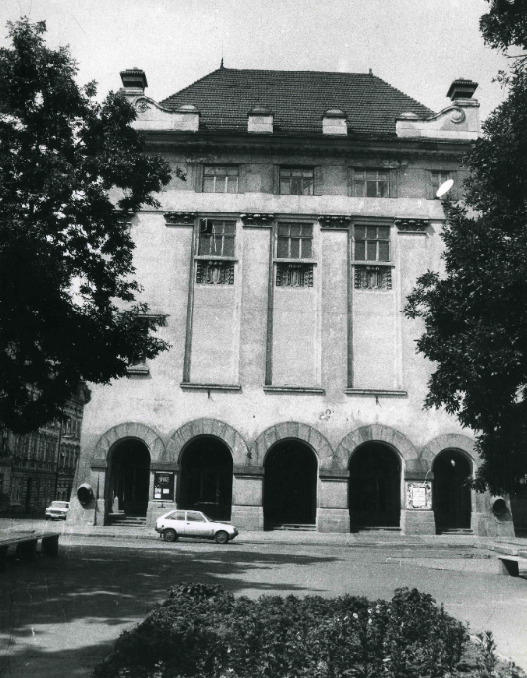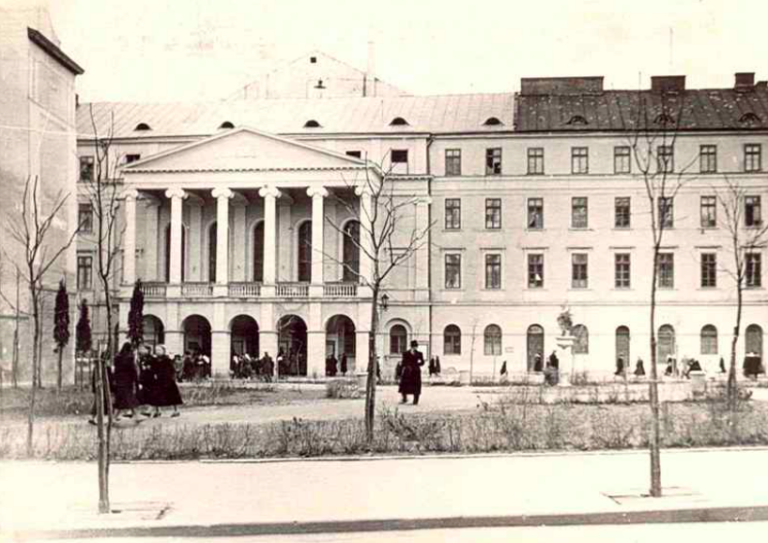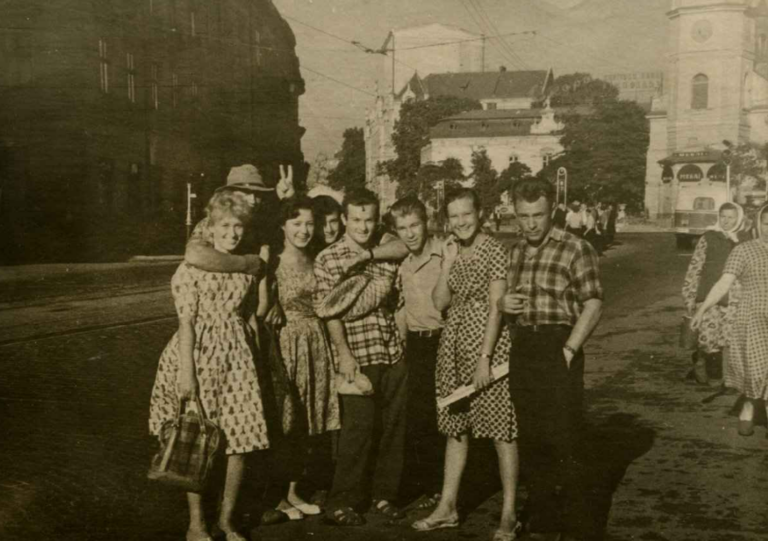Interviewer: Okay. Let’s begin with how you got interested in theater. How did you end up in theater?
Director: Well, first, I studied at university, and it was precisely at that time, around the 22nd, 23rd Party Congress, when Khrushchev came to power, and the so-called “democracy” started, when there emerged various studios, new theaters, and there was such an interest in theater, we ran all over, there were endless tours [in Lviv] from Poland, from Moscow, from Saint-Petersburg….—Leningrad—from Kyiv, and we saw it all. And basically—I was in the department of English Philology, and there were many university students and there was this Misha Reznikovych, who now runs the Lesia Ukrainka [theater in Kyiv]
Interviewer: Oh yeah, Reznikovych.
Director: Reznikovych, yes. He opened, he organized a studio and we all went there. Everyone who wanted to went there, from different [university] departments, and he staged a few shows. This really was the start. Then, he left, and entered the directing department, and suddenly they organized a studio at the Zankovetska Theater and my friend and I—she had already graduated university, Lototska, and she worked for a long time at the Franko Theater, and we both went to the entrance exams and we got in. I was still at university and I finished at both places, I finished the two year program at the studio, two years, but the teachers were amazing. The theater was like this at that time, it was run by Borys Khomych Tiahno, this was one of the best directors in Ukraine, a student of [theater innovator Les] Kurbas. It was a really interesting time, there were really interesting actors. Then Lototska was accepted [professionally] and she stayed at this theater and I left, worked for a bit at the Young Spectators’ Theater [in Lviv] and went to study directing, because I ended up at a rehearsal in Moscow, well, a rehearsal of probably the most distinguished director in the Soviet Union, Efros, there was this Anatolii Efros. And I understood that I could not work with anyone else, that I had to work just with him and so I applied to the directing department in Moscow. More accurately, I applied in Kyiv, but in Kyiv they told me that there was no place for me and there “would not be” in the Ukrainian theater because I read Lina Kostenko [for my audition] and she was almost banned [at that time]. Well, that’s it, and so I graduated, in this way. And then I worked, well, I graduated from a very good directing department and then I worked at the Institute under the Ministry of the RSFSR [Russian Republic], that was necessary to work [like as an internship–trans]….and then they sent me to Kazan, to a great theater, the Academic BDT Theater. And then they invited me to the Mossovet theater in Moscow. And I was there two years. Well, and then there were family situation [her mother was ill—trans], that meant I had to leave very suddenly for Lviv. And I’m here, I have been sitting here since that time. That’s it….
Interviewer: And are you sad that you had to leave, essentially, the capital, the Moscow theater?
Director: I don’t know. We came with [Roman] Viktiuk to Moscow together. And in order to get a hook in Moscow and do something, you had to really shorten your life by two times [work 24/7—trans]. Because there was crazy competition, a rat race. Then at that time there was a group of directors working, they were extremely strong: [Yuri] Liubimov, [Oleg] Efremov, Efros, there was the theater “Sovremennik” and Liubimov’s Taganka theater that had opened. There was such a very, very crazy theatrical life then, and to break in, and with all of that, there was like this huge wall around [Georgii] Tovstunogov and everyone stood around like this huge wall, I’ll never forget. Viktiuk himself, it’s no accident, he sat for a very many years in Moscow [not working], and just could not break in, break through this wall, this line, you know they were really strong and they supported each other. And I would have worked but I probably would have worked less [than I did back in Ukraine], let us put it that way. Then there was—I’m saying this for you because you don’t know—but then when we were starting there was [Dmytro] Pavlychko, and all this group of young Ukrainian poets, there were lots of them, I was thinking of them recently and they were all obsessed with the national idea. Absolutely.
Interviewer: And this were the 1970s?
Director: Yes, the 70s. the 70s, And so I was pulled to Ukraine, a lot.
Interviewer: Aha. And you came back and you found work?
Director: No. I found, I met with [Serhii] Danchenko in Moscow. Well, he was then at Tovstonogov’s laboratory, and they took me at Tovstonogov’s laboratory. Tovstonogov, he was, well, the most powerful director in Europe, and he took only artistic directors to his lab, but somehow, I was lucky and I slipped in, into this workshop. And I talked with Danchenko, and he took me, to the theater, immediately on the roster [that is, on full salary—trans]. And we also knew each other from school, because he was my neighbor growing up, we all lived on one street, now it’s called Lobanovskyi. And that’s how I got to the Zankovetska Theater, well, and then it started, it all started. Of course, sometimes I am sad, but sometimes not, God only knows. That’s how my fate worked out.




This is an excerpt from an interview with a theater director, one of the only women to work her way up through a male-dominated cultural sphere. She worked at several theaters in Lviv and became well-known in late Soviet and post-Soviet Ukraine. This source tells us about late Soviet theater, and the cultural world in general, and the different circulations and pathways between Lviv and Moscow. She mentions Khrushchev’s “Secret Speech” (actually at the 20th, not 22nd Party Congress) and the cultural opening that happened in the 1950s and 1960s. Note that she applied to theater school in Kyiv, but was not accepted – because she auditioned with verse by dissident poet Lina Kostenko. Moscow, however, accepted her. This dynamic of harsher oppression in the republics and less in the center can be observed in several places. Then she mentions all the celebrated directors she works with in the Soviet centers of Moscow and Leningrad: Anatoly Efros worked at Moscow Art Theater and the Taganka, Yuri Liubimov worked at the Taganka, Oleg Efremov at the Sovremennik and then the Moscow Art, and Georgy Tovstonogov worked at the Bolshoi Dramaticheskii Teatr in Leningrad. Remember that she is a young woman from Ukraine studying and struggling to make a name for herself among these major artistic figures. Note she also mentions Roman Viktiuk, who also came from Lviv to Moscow, and yet stayed in Moscow. What might have shaped their different personal and professional trajectories? What role does Moscow play in her life?
This source is also quite revealing about gender in late Soviet culture. Note that she herself never mentions gender, or the male dominance of the theater world, or any ways in which her gender played a role in her life choices. It is up to us, as critical readers, to ask questions of this source and think about how, perhaps, what is does not say is as revealing as what it does. This source challenges us to think about our subjects’ gender categories and not impose our own.